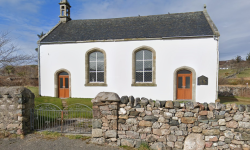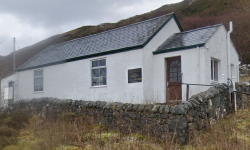John Robertson (1758-1825), Kingussie
John Robertson was the son of Patrick Robertson, schoolmaster, and was born at Auchenhalrig, Bellie, Banffshire, in 1758. In 1774 he was schoolmaster at Langdale, Strathnaver, and afterwards at Achness in the same district. Mr Sage has the following reference to him in his Memorabilia Domestica: “He had boarded at Achoul in William Mackay’s house, and, though he knew not a word of Gaelic, he noticed and was deeply impressed with the warm and unsophisticated piety of his host. He applied himself to the task of acquiring the Gaelic tongue with the whole energies of a highly-gifted re He also made daily progress in the Christian life, and engaged in prayer alternately with his father-in-law in the family and at the fellowship meetings. The teacher studied under the excellent Alexander Urquhart of Rogart, who was then stationed at Achness, and rapidly acquired the knowledge of Latin and Greek, thus preparing himself for the University. He was well on in life when he entered King’s College [Aberdeen], passing through the curriculum there, and studying for three sessions at the Hall, when he was licensed by the Presbytery of Tongue to preach the Gospel. The individual thus prepared by God in circumstances of comparative obscurity was none other than the late Mr John Robertson, minister of Kingussie in Badenoch, a man who became a most distinguished ornament: of the Scottish Church ” (pp. 273, 274, 1st edit.). At a meeting of the Tongue Presbytery (27th October, 1778), the Moderator reported that the Synod had given permission to take Mr Robertson on trials, “but recommended not to license him abruptly unless he shall produce before the Presbytery evidence of his having a mission or settlement secured for him.” At a later meeting the Presbytery received a letter from Mr Hugh Mackay, missionary, Achrenie, parish of Halkirk, informing them that he had accepted the assistantship to Mr Calder, Croy, and the brethren deeming that there was thus an opening for Mr Robertson licensed him. The Synod, however, decided that the Presbytery had exceeded its instructions, and it was ‘‘appointed to be suitably admonished from the chair to be more cautious and circumspect for the future (Register of the Synod of Sutherland and Caithness, 1790). On 25th June, 1789, a letter had been received by the Presbytery from Rev. John Cameron, Halkirk, and Rev. Robert Gunn, Latheron, intimating that they, with the people of Achrenie, had made choice of Mr John Robertson, and requesting that the Tongue Presbytery to ordain him, which they accordingly did. — He remained at Achrenie five years, when he was transferred to the Eriboll Mission. He was called to the Chapel of Ease, Rothesay, in 1799, and afterwards to Kingussie, where he was inducted, 16th August 1810.
Both in Achness and Achrenie there were many of the excellent of the earth, and Mr Robertson benefited by their fellowship, while they benefited by his preaching. The same may be said of the Eriboll Mission. While the gospel had been faithfully preached in these places, yet it was noticed that there was a reviving during Mr Robertson’s ministry. Dr Mackintosh Mackay says in his Gaelic preface to Dr Macdonald’s Elegy on Mr Robertson that at the time of writing there were those living on whose face it could be seen when Mr Robertson’s name was mentioned that they had received in truth benefit from his teaching. He further adds that at the time of writing there were many in the parish of Kingussie and district who would confess that it was a happy day for them when Mr Robertson came to Kingussie. Dr Mackay’s description of his gifts, which, when sanctified and used by the Holy Spirit, made him as a polished shaft in the hand of his God, may be here quoted:—“Mr Robertson was a man who had few equals in many ways. It is not too much to say that he was honourable amongst the honourable. His abilities , even as natural gifts, were high, able, well grounded, and extensive. And when the living breath breathed on them, when the sun shone upon them, when they were baptized with fire, as was done in truth, then it was seen how beautiful and how powerful an instrument grace prepared for the service to which he was called. Though not belonging to the Highlands, the manner in which he acquired Gaelic was a witness to the gifts which had been bestowed upon him, inasmuch as he got such a mastery of it, even as a language, that no one would know but it was his native mother-tongue. He was specially helpful in his preaching in dealing with the feelings and experiences of God’s children in their sorrows and weaknesses. It was here he excelled in bringing comfort to the distressed, and he left the impression on his hearers that he himself had bathed in the fountain of eternal love, so tenderly and compassionately did he deal with the cases of the afflicted. His manner of serving the Lord’s Table was very solemn and impressive, as with a full heart he poured out the spiritual, weighty message, as if standing beside the Cross, praising and exalting the Lamb.
Mr Robertson was Dr Macdonald’s favourite preacher, and one of his finest elegies1 is composed in his honour. A few lines may be quoted, though we regret we have no good metrical translation to give:—
A Mhaighstir Robinson na h-àill’;
Bu ghoirt am buille dhuinn do bhàs
Is iomadh neach de chloinn nan gras,
Rinn sud ro-chràiteach, muladach.‘Oir ’s tearc ud b’ urrainn domh a luaidh
Do theachd’ribh treun an Tiomnaidh ‘Nuaidh
A réir mo bheachds’, a thigeadh suas
Riut féin a’m buadhaibh urramach.“Bha agad gibhtean, aithnicht’, treun
Is buadhan naduir bha d’an réir;
Ach thug thu ’m barrachd measg nan ceud,
An tuigse gheur, ’s am breithneachadh.“’S a thaobh gach buaidh dhiubh sud gu léir,
Bu chuimseach freag’rach iad r’a chéil’:
Gach aon diubh ’deanamh gniomh a dreuchd
‘S gu grinn le chéil ag oibreachhadh.“Is mairg air gibhtibh dheanadh tàir,
Tha teachd a nuas o’n Ti a’s Aird’,
Oir ged—dhiubh féin—nach dean iad stà,
Ni cumhachd gràis ’n am beannachd iad.
Mr Robertson was married to Christian, daughter of William Mackay, Achoul, one of the most noted of the Strathnaver “Men.” His end came, after a severe and :lingering illness, on 4th March, 1825. The Inverness Courier, in its issue of the 17th of the same month, says:
“In Mr Robertson the Church of Scotland has been deprived of a distinguished ornament, and his family and parish have sustained an incalculable loss. There was in his character a happy union of great intellect, fervent and rational piety and zeal, tempered by judgment and controlled by discriminating prudence. As a preacher his talents were of no common order. Possessed of a clear and comprehensive understanding, he made the most intricate subjects intelligible to the meanest capacity. His reasoning was always close , cogent and convincing; his illustrations rich and varied; his similes in the highest degree chaste, striking, and appropriate; his appeals to the heart powerful and persuasive, and these important requisites of the ministerial character were rendered – doubly interesting by his sincerity and unction with which they were inculcated. None who had the happiness of hearing him could fail to perceive that his whole soul was occupied with his subject, and that he felt the deepest concern for the immortal interests of those whom he addressed. The sincerity which he displayed in the pulpit he daily cherished and eminently exemplified in his intercourse with the world. He was an “Israelite indeed, in whom there was no guile.” He detested that temporising policy which, contrary to deliberate conviction, accommodates itself to the feelings and sentiments of others. In short, in all the relations of life, but especially in the domestic circle, he practised the duties which in his public ministrations he so earnestly and piously enforced. These excellences were well appreciated by his affectionate flock, for it may with truth be affirmed that no pastor was ever more revered and beloved by his people, or went down to the grave more deeply and generally lamented. ‘The righteous shall be held in everlasting remembrance.’”
(Barron’s The Northern Highlands in the Nineteenth Century, iii., 4, and Inverness Courier, 17th March).
Source: Donald Beaton, Notable Ministers of the Northern Highlands, Inverness, 1929.
1Prof. Stuart Blackie has given a metrical translation of the prelude to this fine elegy. It is given in Macpherson’s Church and Social Life in the Highlands, p. 209. Dr Kennedy, in his Apostle of the North, gives a prose translation of some of the concluding stanzas of the elegy.
———-
Dr Mackintosh Mackay in Orian Le Rob Donn, wrote of the regard the men of Eriboll had for Mr Robertson:
In 1795, the Mackay or Reay Highlanders, commanded by General Hugh Baillie were embodied at Elgin, and ordered thence to Ireland. During their stay in that country, I have been assured by the officers of that corps, that there was not a single barrack occupied by the private soldiers, which had not a newspaper as regularly as the commanding officers had theirs; and whoever of the inmates was esteemed the fittest to read, and explain to such as could not read for themselves, was employed to read aloud for the benefit of all. In this way passed their evenings, not in rioting and drunkenness; and the money thus saved, was remitted for the benefit of their families and relatives at home. One instance in point I will mention, to prove the feelings that actuated the Reay Highlanders of that time. When the regiment was raised, our late dear friend and highly respected pastor, the Rev. John Robertson, afterwards of Kingussie, held the mission of the Eriboll district. The men loved him to enthusiasm. A vessel bound for Loch Eriboll touched at Belfast, where the regiment was then stationed. Immediately, the men from the bounds of the mission assembled, and purchased a quantity of tea and sugar to send by the vessel to Mrs. Robertson, as an humble but faithful expression of their undiminished regard.

